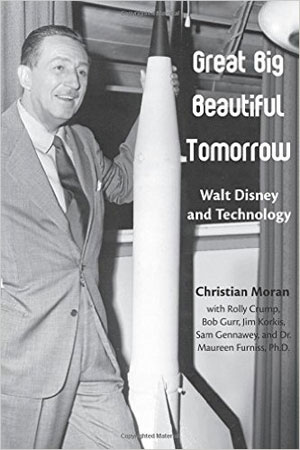
Podcast: Play in new window | Download | Embed
It’s always a thrill to speak with writers and filmmakers that have a passion for Disney history. Thankfully, Christian Moran checks both of those boxes. He’s the author of Great Big Beautiful Tomorrow: Walt Disney and Technology and has created a documentary about the same topic.
Christian was kind enough to speak with me about the new book for the latest episode of The Tomorrow Society Podcast. He has knowledge about Walt Disney’s life through his extensive research on the big topic. By narrowing the focus for this project, Christian’s book and film aren’t overwhelmed by trying to encompass the volume of Walt’s life.
Our discussion covers what made Walt so important, particularly his achievements with technology. In addition, we delve into challenges with staying optimistic today. It’s a difficult time yet there are positive signs if you look hard enough. Christian also gives background on other projects, including the web series Everything Will Be Alright. You should definitely check out his other work, some which is referenced below. He continues to write and direct interesting projects about Disney and related subjects.
Show Notes: Christian Moran
Learn more about Great Big Beautiful Tomorrow and other projects from Christian Moran on his official website.
Follow Christian Moran on Twitter and Instagram.
Support The Tomorrow Society by making a one-time donation and buy me a Dole Whip!
Related Articles
Great Big Beautiful Tomorrow: Walt Disney and Technology
True-Life Adventures: A History of Walt Disney’s Nature Documentaries
This post contains affiliate links. Making any purchase through those links supports this site. See full disclosure.



Just got done listening to the podcast and I thought your interview with Mr. Moran was very engaging and interesting. I too have always admired Walt Disney’s optimism, his desire to push new technologies and his ability to knock down the barriers before him.
Spurred by recent articles, books and movies, I’ve been wondering myself why American society has grown so pessimistic about the future. Even during the turbulent 1960s, it seemed that people had faith that we could create a better tomorrow. Despite war and civil unrest, the decade saw the dawn of the jet age, space age and computer age. The pace of technology must have seemed unstoppable.
Now we live in the information age but the general public seems oblivious to the technologies that lie on the horizon. NASA is working on spacecraft to send humans deeper into space than ever before but how many people know the SLS/Orion program even exists? Doctors can 3D print sections of the human skull and implant them in patients suffering from genetic growth disorders, but you won’t hear about it on the local news report. The only tech news that gains any traction is Apple’s latest iPhone announcement.
I think if people knew more about the scientific advances happening right in front of us they would be more optimistic about the future. The information is out there, we just need to find a way to get people talking about.
Ron, thanks for the great comment. It’s a tricky question because I’ve met plenty of people that are interested in new technologies and where society is going in the future. On the other hand, there isn’t the same wave permeating the news and leadership. I think everything goes in cycles, though. If NASA actually sent humans to Mars, I believe people would be thrilled by it.
I think part of the problem is that science is no longer taught in the lower grades. Children are naturally curious and if they are exposed the wonders of science, engineering and technology during their formative years they will be more likely pursue these paths as adults.
A few years ago when Space Shuttle Endeavour was flown over the Los Angeles area on it’s way the California Science Center my cousin took her 2nd grade classs outside to watch. Her students talked about the shuttle for weeks afterward and wanted to know more about space flight.
Hopefully once the SLS program and private firms like SpaceX and Boeing start sending humans into space again it will rekindle public interest the exploration of outer space.
I hope so. My daughter’s in first grade, and one of her favorite places is the local science center. A lot of that is probably me taking her there, but it didn’t take much convincing.